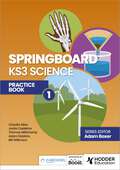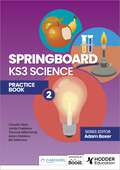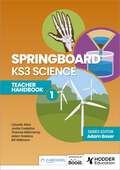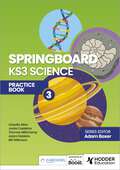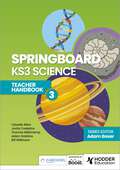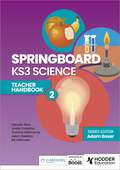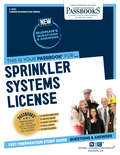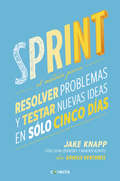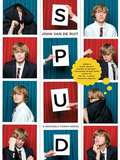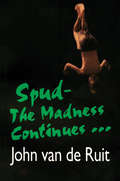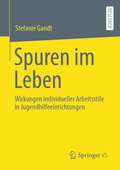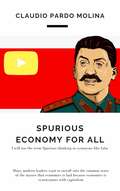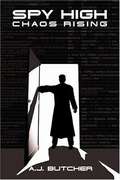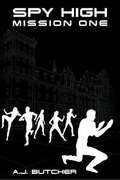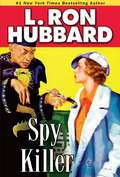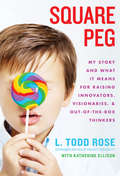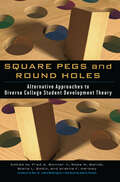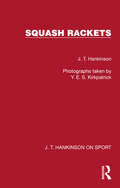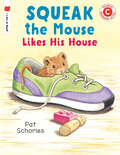- Table View
- List View
Springboard: KS3 Science Practice Book 1
by Adam Boxer Adam Robbins Jovita Castelino Claudia Allan Thomas Millichamp Bill WilkinsonProvide all the independent practice needed for your Springboard Science course with over 1000 questions in each Practice Book.Designed to be used alongside our Knowledge Book, our Practice Books provide shed loads of practice (SLOP) for students to consolidate, apply and extend the knowledge that they have learnt.With decades of teaching experience and extensive knowledge of applying cognitive science in the classroom, you can trust our author team to have created carefully crafted and varied questions for independent practice.> Improve students' long-term retention. Spacing is built in throughout this Practice Book, improving retention over time.> Highlight connections between topics and Sciences. Interleaving of content encourages students to recognise and focus on the connections, similarities and differences across science, enabling them to reflect on their learning in more depth.> Build confidence in the key skills. Question sets include coverage of the key mathematical and working scientifically skills that students need to understand, ensuring that this knowledge is embedded throughout their independent practice.> Support every student. Links to the relevant worked examples in the Knowledge Book are highlighted throughout each unit for easy reference.> Prepare for the next step. Questions increase in difficulty throughout each topic, enabling students to progress through the KS3 curriculum and prepare for KS4 and beyond. Answers are available online for free, and also embedded into the lesson presentations in our Boost digital teaching and learning resources for easy in-class independent practice review.
Springboard: KS3 Science Practice Book 1
by Adam Boxer Adam Robbins Jovita Castelino Claudia Allan Thomas Millichamp Bill WilkinsonProvide all the independent practice needed for your Springboard Science course with over 1000 questions in each Practice Book.Designed to be used alongside our Knowledge Book, our Practice Books provide shed loads of practice (SLOP) for students to consolidate, apply and extend the knowledge that they have learnt.With decades of teaching experience and extensive knowledge of applying cognitive science in the classroom, you can trust our author team to have created carefully crafted and varied questions for independent practice.> Improve students' long-term retention. Spacing is built in throughout this Practice Book, improving retention over time.> Highlight connections between topics and Sciences. Interleaving of content encourages students to recognise and focus on the connections, similarities and differences across science, enabling them to reflect on their learning in more depth.> Build confidence in the key skills. Question sets include coverage of the key mathematical and working scientifically skills that students need to understand, ensuring that this knowledge is embedded throughout their independent practice.> Support every student. Links to the relevant worked examples in the Knowledge Book are highlighted throughout each unit for easy reference.> Prepare for the next step. Questions increase in difficulty throughout each topic, enabling students to progress through the KS3 curriculum and prepare for KS4 and beyond. Answers are available online for free, and also embedded into the lesson presentations in our Boost digital teaching and learning resources for easy in-class independent practice review.
Springboard: KS3 Science Practice Book 2
by Adam Boxer Adam Robbins Jovita Castelino Claudia Allan Thomas Millichamp Bill WilkinsonProvide all the independent practice needed for your Springboard Science course with over 1000 questions in each Practice Book.Designed to be used alongside our Knowledge Book, our Practice Books provide shed loads of practice (SLOP) for students to consolidate, apply and extend the knowledge that they have learnt.With decades of teaching experience and extensive knowledge of applying cognitive science in the classroom, you can trust our author team to have created carefully crafted and varied questions for independent practice.> Improve students' long-term retention. Spacing is built in throughout this Practice Book, improving retention over time.> Highlight connections between topics and Sciences. Interleaving of content encourages students to recognise and focus on the connections, similarities and differences across science, enabling them to reflect on their learning in more depth.> Build confidence in the key skills. Question sets include coverage of the key mathematical and working scientifically skills that students need to understand, ensuring that this knowledge is embedded throughout their independent practice.> Support every student. Links to the relevant worked examples in the Knowledge Book are highlighted throughout each unit for easy reference.> Prepare for the next step. Questions increase in difficulty throughout each topic, enabling students to progress through the KS3 curriculum and prepare for KS4 and beyond. Answers are available online for free, and also embedded into the lesson presentations in our Boost digital teaching and learning resources for easy in-class independent practice review.
Springboard: KS3 Science Practice Book 2
by Adam Boxer Adam Robbins Jovita Castelino Claudia Allan Thomas Millichamp Bill WilkinsonProvide all the independent practice needed for your Springboard Science course with over 1000 questions in each Practice Book.Designed to be used alongside our Knowledge Book, our Practice Books provide shed loads of practice (SLOP) for students to consolidate, apply and extend the knowledge that they have learnt.With decades of teaching experience and extensive knowledge of applying cognitive science in the classroom, you can trust our author team to have created carefully crafted and varied questions for independent practice.> Improve students' long-term retention. Spacing is built in throughout this Practice Book, improving retention over time.> Highlight connections between topics and Sciences. Interleaving of content encourages students to recognise and focus on the connections, similarities and differences across science, enabling them to reflect on their learning in more depth.> Build confidence in the key skills. Question sets include coverage of the key mathematical and working scientifically skills that students need to understand, ensuring that this knowledge is embedded throughout their independent practice.> Support every student. Links to the relevant worked examples in the Knowledge Book are highlighted throughout each unit for easy reference.> Prepare for the next step. Questions increase in difficulty throughout each topic, enabling students to progress through the KS3 curriculum and prepare for KS4 and beyond. Answers are available online for free, and also embedded into the lesson presentations in our Boost digital teaching and learning resources for easy in-class independent practice review.
Springboard: KS3 Science Teacher Handbook 1
by Adam Boxer Adam Robbins Jovita Castelino Claudia Allan Thomas Millichamp Bill WilkinsonDeliver the Springboard Science course confidently with this workload-friendly approach to a knowledge-rich curriculum.Learn how to use cognitive science principles to deliver more effective, dynamic and engaging lessons, whatever your level of experience. Divided into topics, rather than lessons, this handbook enables you to teach each topic in a responsive fashion and at a pace that is right for your students.> Feel fully supported. Guided explanations, diagram constructions, demonstrations and worked examples have been carefully crafted to support all teachers, including those teaching outside of their subject specialism. > Overcome common misconceptions. Prerequisite knowledge checks for students help you to identify any missing knowledge or misconceptions before a topic is started, with approaches to solve these covered throughout the explanations.> Tailor teaching to the class in front of you. 'Check for understanding' questions allow you to adapt your delivery to meet students' needs, with suggested questions and responses to start the process. > Take a different approach to practicals. Our 'slow practical' approach exemplifies core concepts and provides students with a clear grounding in practical skills, with at least one essential practical for every unit.
Springboard: KS3 Science Teacher Handbook 1
by Adam Boxer Adam Robbins Jovita Castelino Claudia Allan Thomas Millichamp Bill WilkinsonDeliver the Springboard Science course confidently with this workload-friendly approach to a knowledge-rich curriculum.Learn how to use cognitive science principles to deliver more effective, dynamic and engaging lessons, whatever your level of experience. Divided into topics, rather than lessons, this handbook enables you to teach each topic in a responsive fashion and at a pace that is right for your students.> Feel fully supported. Guided explanations, diagram constructions, demonstrations and worked examples have been carefully crafted to support all teachers, including those teaching outside of their subject specialism. > Overcome common misconceptions. Prerequisite knowledge checks for students help you to identify any missing knowledge or misconceptions before a topic is started, with approaches to solve these covered throughout the explanations.> Tailor teaching to the class in front of you. 'Check for understanding' questions allow you to adapt your delivery to meet students' needs, with suggested questions and responses to start the process. > Take a different approach to practicals. Our 'slow practical' approach exemplifies core concepts and provides students with a clear grounding in practical skills, with at least one essential practical for every unit.
Springboard: Ks3 Science Practice Book
by Adam Boxer Adam Robbins Jovita Castelino Claudia Allan Thomas Millichamp Bill WilkinsonProvide all the independent practice needed for your Springboard Science course with over 1000 questions in each Practice Book.Designed to be used alongside our Knowledge Book, our Practice Books provide shed loads of practice (SLOP) for students to consolidate, apply and extend the knowledge that they have learnt.With decades of teaching experience and extensive knowledge of applying cognitive science in the classroom, you can trust our author team to have created carefully crafted and varied questions for independent practice.> Improve students' long-term retention. Spacing is built in throughout this Practice Book, improving retention over time.> Highlight connections between topics and Sciences. Interleaving of content encourages students to recognise and focus on the connections, similarities and differences across science, enabling them to reflect on their learning in more depth.> Build confidence in the key skills. Question sets include coverage of the key mathematical and working scientifically skills that students need to understand, ensuring that this knowledge is embedded throughout their independent practice.> Support every student. Links to the relevant worked examples in the Knowledge Book are highlighted throughout each unit for easy reference.> Prepare for the next step. Questions increase in difficulty throughout each topic, enabling students to progress through the KS3 curriculum and prepare for KS4 and beyond. Answers are available online for free, and also embedded into the lesson presentations in our Boost digital teaching and learning resources for easy in-class independent practice review.
Springboard: Ks3 Science Practice Book
by Adam Boxer Adam Robbins Jovita Castelino Claudia Allan Thomas Millichamp Bill WilkinsonProvide all the independent practice needed for your Springboard Science course with over 1000 questions in each Practice Book.Designed to be used alongside our Knowledge Book, our Practice Books provide shed loads of practice (SLOP) for students to consolidate, apply and extend the knowledge that they have learnt.With decades of teaching experience and extensive knowledge of applying cognitive science in the classroom, you can trust our author team to have created carefully crafted and varied questions for independent practice.> Improve students' long-term retention. Spacing is built in throughout this Practice Book, improving retention over time.> Highlight connections between topics and Sciences. Interleaving of content encourages students to recognise and focus on the connections, similarities and differences across science, enabling them to reflect on their learning in more depth.> Build confidence in the key skills. Question sets include coverage of the key mathematical and working scientifically skills that students need to understand, ensuring that this knowledge is embedded throughout their independent practice.> Support every student. Links to the relevant worked examples in the Knowledge Book are highlighted throughout each unit for easy reference.> Prepare for the next step. Questions increase in difficulty throughout each topic, enabling students to progress through the KS3 curriculum and prepare for KS4 and beyond. Answers are available online for free, and also embedded into the lesson presentations in our Boost digital teaching and learning resources for easy in-class independent practice review.
Springboard: Ks3 Science Teacher Handbook 3
by Adam Boxer Adam Robbins Jovita Castelino Claudia Allan Thomas Millichamp Bill WilkinsonDeliver the Springboard Science course confidently with this workload-friendly approach to a knowledge-rich curriculum.Learn how to use cognitive science principles to deliver more effective, dynamic and engaging lessons, whatever your level of experience. Divided into topics, rather than lessons, this handbook enables you to teach each topic in a responsive fashion and at a pace that is right for your students.> Feel fully supported. Guided explanations, diagram constructions, demonstrations and worked examples have been carefully crafted to support all teachers, including those teaching outside of their subject specialism. > Overcome common misconceptions. Prerequisite knowledge checks for students help you to identify any missing knowledge or misconceptions before a topic is started, with approaches to solve these covered throughout the explanations.> Tailor teaching to the class in front of you. 'Check for understanding' questions allow you to adapt your delivery to meet students' needs, with suggested questions and responses to start the process. > Take a different approach to practicals. Our 'slow practical' approach exemplifies core concepts and provides students with a clear grounding in practical skills, with at least one essential practical for every unit.
Springboard: Ks3 Science Teacher Handbook 3
by Adam Boxer Adam Robbins Jovita Castelino Claudia Allan Thomas Millichamp Bill WilkinsonDeliver the Springboard Science course confidently with this workload-friendly approach to a knowledge-rich curriculum.Learn how to use cognitive science principles to deliver more effective, dynamic and engaging lessons, whatever your level of experience. Divided into topics, rather than lessons, this handbook enables you to teach each topic in a responsive fashion and at a pace that is right for your students.> Feel fully supported. Guided explanations, diagram constructions, demonstrations and worked examples have been carefully crafted to support all teachers, including those teaching outside of their subject specialism. > Overcome common misconceptions. Prerequisite knowledge checks for students help you to identify any missing knowledge or misconceptions before a topic is started, with approaches to solve these covered throughout the explanations.> Tailor teaching to the class in front of you. 'Check for understanding' questions allow you to adapt your delivery to meet students' needs, with suggested questions and responses to start the process. > Take a different approach to practicals. Our 'slow practical' approach exemplifies core concepts and provides students with a clear grounding in practical skills, with at least one essential practical for every unit.
Springboard: Teacher Handbook 2
by Adam Boxer Adam Robbins Jovita Castelino Claudia Allan Thomas Millichamp Bill WilkinsonDeliver the Springboard Science course confidently with this workload-friendly approach to a knowledge-rich curriculum.Learn how to use cognitive science principles to deliver more effective, dynamic and engaging lessons, whatever your level of experience. Divided into topics, rather than lessons, this handbook enables you to teach each topic in a responsive fashion and at a pace that is right for your students.> Feel fully supported. Guided explanations, diagram constructions, demonstrations and worked examples have been carefully crafted to support all teachers, including those teaching outside of their subject specialism. > Overcome common misconceptions. Prerequisite knowledge checks for students help you to identify any missing knowledge or misconceptions before a topic is started, with approaches to solve these covered throughout the explanations.> Tailor teaching to the class in front of you. 'Check for understanding' questions allow you to adapt your delivery to meet students' needs, with suggested questions and responses to start the process. > Take a different approach to practicals. Our 'slow practical' approach exemplifies core concepts and provides students with a clear grounding in practical skills, with at least one essential practical for every unit.
Springboard: Teacher Handbook 2
by Adam Boxer Adam Robbins Jovita Castelino Claudia Allan Thomas Millichamp Bill WilkinsonDeliver the Springboard Science course confidently with this workload-friendly approach to a knowledge-rich curriculum.Learn how to use cognitive science principles to deliver more effective, dynamic and engaging lessons, whatever your level of experience. Divided into topics, rather than lessons, this handbook enables you to teach each topic in a responsive fashion and at a pace that is right for your students.> Feel fully supported. Guided explanations, diagram constructions, demonstrations and worked examples have been carefully crafted to support all teachers, including those teaching outside of their subject specialism. > Overcome common misconceptions. Prerequisite knowledge checks for students help you to identify any missing knowledge or misconceptions before a topic is started, with approaches to solve these covered throughout the explanations.> Tailor teaching to the class in front of you. 'Check for understanding' questions allow you to adapt your delivery to meet students' needs, with suggested questions and responses to start the process. > Take a different approach to practicals. Our 'slow practical' approach exemplifies core concepts and provides students with a clear grounding in practical skills, with at least one essential practical for every unit.
Sprinkler Systems License: Passbooks Study Guide (Career Examination Series)
by National Learning CorporationThe Sprinkler Systems License Passbook® prepares you for your test by allowing you to take practice exams in the subjects you need to study. It provides hundreds of questions and answers in the areas that will likely be covered on your upcoming exam.
Sprint: El método para resolver problemas y testar nuevas ideas en solo 5 días
by Braden Kowitz John Zeratsky Jake KnappCreado por Jake Knapp, John Zeratsky y Braden Kowitz, tres socios de Google Ventures, SPRINT es un método único e infalible de 5 días para solventar problemas empresariales complicados y conseguir que la viabilidad de un proyecto se implante rápidamente. Probado con éxito en más de 100 ocasiones. Tanto los emprendedores como los directivos tienen que enfrentarse todos los días a dilemas importantes: ¿Dónde hay que poner las prioridades y por dónde hay que empezar?, ¿cuántas reuniones son necesarias para dar con la solución más adecuada? Ahora ya disponemos de un método seguro para responder a estas cuestiones cruciales: el Sprint. El diseñador Jake Knapp creó este proceso de cinco días en Google, donde los sprints se empleaban para todo tipo de proyectos, desde el Google Search hasta Google X. En Google Ventures empezó a trabajar con Braden Kowitz y John Zeratsky y los tres han conducido más de cien sprints con empresas del sector de la telefonía móvil, del comercio electrónico, la sanidad, las finanzas y otros. Como guía práctica para resolver importantes problemas empresariales, Sprint puede resultar muy útil para todo tipo de equipos de cualquier dimensión, desde pequeñas startups hasta grandes empresas multinacionales, desde equipos de profesores a empresas sin ánimo de lucro. Se trata de un libro para cualquiera con una oportunidad, idea o problema que necesite una respuesta rápida. La opinión de los expertos:«Lea este libro y siga sus consejos si quiere desarrollar productos mejores y más deprisa.»Ev Williams, fundador de Medium y Twitter «Sprint ofrece una fórmula transformadora para testar ideas, muy útil tanto si se aplica a una startup como a cualquier gran organización. En tan solo cinco días, podremos pasar de una idea inicial al prototipoy la decisión final ahorrándonos un montón de horas y dinero. Una lectura obligatoria para emprendedores de cualquier tipo.»Eric Ries, autor de El método Lean Startup «Todos los directivos que conozco están preocupados por lo mismo: ¿Nos estamos moviendo lo suficientemente rápido? Sprint nos ofrece un método paso a paso para resolver problemas de envergadura y avanzar en lo que realmente importa con rapidez. Un sprint es la cura para los males de la empresas en un mundo que va cada día más rápido.»Beth Comstock, vice-presidenta de General Electric
Spud
by John van de RuitSpud is the hilarious debut novel by John van de RuitIt's 1990. Apartheid is crumbling, Nelson Mandela has just been released from prison and thirteen-year-old Spud Milton is about to start his first year at an elite boys-only boarding school. Cursed with embarrassingly dysfunctional parents, a nutty granny and a dormitory full of strange characters, Spud has his hands full trying to adapt to his new home. With only his wits and his diary, he takes readers on a rowdy boarding school romp full of illegal midnight swims, catastrophic cricket matches, ghostbusting escapades, girls and disastrous holidays. South African comedian John van de Ruit invites the reader into the mind of a young boy whose eyes are being opened to love, friendship and complete insanity!Some rave reviews from South Africa:'Funny, fast-paced and wonderfully observant' - The Daily News'Once you pick it up it's almost as if the pages turn themselves' - Metrobeat'Achingly funny' - Sunday Times LifestyleJohn van de Ruit was born in Durban, South Africa. He went to the University of Natal where he completed a Masters degree in Drama and Performance. Since 1998 he has been a professional actor, playwright and producer, winning numerous awards. Spud is his first novel.
Spud-The Madness Continues: The Madness Continues
by John van de RuitThe record-breaking, bestselling sequel to Spud! It's 1991, and John "Spud" Milton's journey to manhood is still creeping along at a snail's pace. Nearly fifteen, Spud's starting his second year at boarding school and-to his utter mortification-he's still a spud! To make things worse, his dorm mates, the legendary Crazy Eight, have an unusual new member (Roger the cat), and his house is home to a new batch of unruly first years. Spud is soon plagued with women trouble, coerced into expulsion-worthy adventures, and frustrated to find his dreams of fame in tatters after landing the part of the Dove of Peace in a disastrous production of Noah's Ark. Join Spud as he takes another tentative step forward while all around him the madness continues. . . .
Spuren im Leben: Wirkungen individueller Arbeitsstile in Jugendhilfeeinrichtungen
by Stefanie GandtDas Erkenntnisinteresse der qualitativen Forschungsarbeit liegt im Praxisfeld der Kinder- und Jugendhilfe und fokussiert sich dort auf den Bereich der Hilfen zur Erziehung. Von Interesse sind die Spuren, die die individuelle Bearbeitung von Kernproblemen durch professionelle Akteur:innen im sonderpädagogischen Hort in den Biographien der Adressat:innen hinterlässt. Der multiperspektivischen Wirklichkeit wird im besonderen Rechnung getragen, in dem aus den drei Perspektiven Institution, Adressat:in und professionelle Akteur:innen auf die Wirkung der Hilfen zu Erziehung geblickt wird und die Ergebnisse mit Hilfe einer Mehrebenenanalyse miteinander in Beziehung gesetzt werden. Aus den Merkmalen wird ein Kontinuum entwickelt, welches den "charismatischen Arbeitsstil" beispielhaft skizziert.
Spurious Economy for All
by Claudio Pardo MolinaMany modern leaders want to install into the common sense of the masses that economics is bad because economics is synonymous with capitalism. And they do it through countless spurious examples that I will be giving throughout this book. I will use the term Spurious thinking of synonyms such as illegitimate, adulterated, counterfeit, imitated, fraudulent and false. And these spurious examples are given when they explain economic problems with a part of the whole theory because the only purpose is to discredit this social science. Because as mothers and grandmothers tell us as children "A half truth is also a lie."
Spy High: CHAOS Rising
by A. J. ButcherThe members of the Bond team at Deveraux Academy, a special high school that trains students to be secret agents, try to save the world from a deadly computer virus designed by CHAOS to destroy computer programs and human life.
Spy High: The Frankenstein Factory
by A. J. ButcherA new series featuring the next generation of James Bonds kicks off. To the outside world, the New England boarding school known as Devereaux Academy looks no different than any other exclusive private school. But to first-year students, it goes by the name Spy High.
Spy Killer
by L. Ron HubbardDiscover intrigue and suspense. Kurt Reid may be innocent of the murder he's charged with (and of grand larceny, for that matter), but he's got no time to be thrown in jail and defend himself. Instead, Reid flees to pre-Communist China and Shanghai, the exotic city of mystery and death.Reid takes refuge in a tea house where he meets White Russian Varinka Savischna, whom he manages to rescue from certain death. As beautiful as she is smart, she recruits him in her crusade against Chinese intelligence services. Unfortunately, Reid manages to get himself captured by the Chinese and blackmailed into pursuing and assassinating a Japanese spy.Now Reid must enter the cloak-and-dagger world of espionage and intrigue, where everything and everyone is not who or what they appear to be. "...novella length adventure-cum-mystery stories based in 1930's China offer further evidence of Hubbard's pulp-action mastery." --Ellery Queen
Square Peg: My Story and What It Means for Raising Innovators, Visionaries, and Out-of-the-Box Thinkers
by Todd RoseIn the seventh grade, Todd Rose was suspended-not for the first time-for throwing six stink bombs at the blackboard, where his art teacher stood with his back to the class. At eighteen, he was a high school dropout, stocking shelves at a department store for $4.25 an hour. Today, Rose is a faculty member at the Harvard Graduate School of Education.Square Peg illuminates the struggles of millions of bright young children--and their frustrated parents and teachers--who are stuck in a one-size-fits-all school system that fails to approach the student as an individual. Rose shares his own incredible journey from troubled childhood to Harvard, seamlessly integrating cutting-edge research in neuroscience and psychology along with advances in the field of education, to ultimately provide a roadmap for parents and teachers of kids who are the casualties of America's antiquated school system.With a distinguished blend of humor, humility, and practical advice for nurturing children who are a poor fit in conventional schools, Square Peg is a game-changing manifesto that provides groundbreaking insight into how we can get the most out of all the students in our classrooms, and why today's dropouts could be tomorrow's innovators.
Square Pegs and Round Holes: Alternative Approaches to Diverse College Student Development Theory
by Rosa M. Banda Fred A. Bonner Stella L. Smith Aretha F. Marbley Jamie Washington Amelia ParnellDeveloping alternative student development frameworks and models, this groundbreaking book provides student affairs practitioners, as well as faculty, with illuminating perspectives and viable approaches for understanding the development of today’s diverse student populations, and for building the foundation for their academic success and self-authorship. With the increasing number of adult working students, minoritized, multiracial, LGTBQ, and first-generation students, this book offers readers vital insights into –and ways to interrogate– existing practice, and develop relevant responses to the needs of these populations.Building on and critiquing the past frameworks, and integrating the insights of contemporary scholarship on student development, the contributors collectively put forward a robust theoretical and methodological foundation for this work, using Critical Race Theory as their central frame. CRT allows chapter authors to situate race related encounters at the center of their proposed alternative framework or model, and deconstruct and challenge commonly held assumptions about diverse college student development. In the tradition of CRT, each author offers an alternative model or framework that can be applied to the diverse population upon which the chapter is framed, prompting readers to address such questions as:• Who are our college students?• What set of experiences do our students bring to the higher education context? • What role have their environments/contexts (i.e. home, p-12, community, family, peer groups, mentors) played in our student’s lives? • What impact have intervening variables (i.e. race, oppression, power) hadon their experiences?• What strategies do they use to overcome developmental obstacles?• How do they define success, and how they know they have achieved it ?By laying bare the experiences of these diverse college students that inform this volume’s “alternative” frameworks this book contests that notion that they constitute square pegs that must fit into the round holes of traditional frameworks.
Squash Rackets (J. T. Hankinson on Sport)
by J. T. HankinsonOriginally published in 1949, in Squash Rackets, Mr Hankinson produced something that was outstanding. The written description was reduced to a minimum, and the teaching was built up round the photographs – and these were remarkable for the time. For the first time action photographs illustrated all the strokes in squash rackets, and the young player who acted as model did his work excellently. Not content with that, the author and his photographer, used their ingenuity in providing excellent photographs to illustrate the tactical side of the game. A model court was constructed, and, as players, two realistic puppets were used. The result was a series of photographs which not only explain the tactics, but also looked most convincing.The author’s previous titles had been very successful, and this attractive and ingenious book was a welcome addition to the series. Today it can be enjoyed in its historical context.
Squeak the Mouse Likes His House (I Like to Read)
by Pat SchoriesThe illustrator of the best-selling Biscuit books has created an adorable mouse who inhabits a Borrowers-like world.To a tiny creature like Squeak, a sneaker can become a bed, a toy can become a vehicle, and a few crumbs can become a meal. Readers will be fascinated by the contrast in scale between the giant human world (inhabited by two unsuspecting children) and the diminutive mouse world. As an extra treat, there are fun mazes on the endpapers that follow Squeak's adventure!
